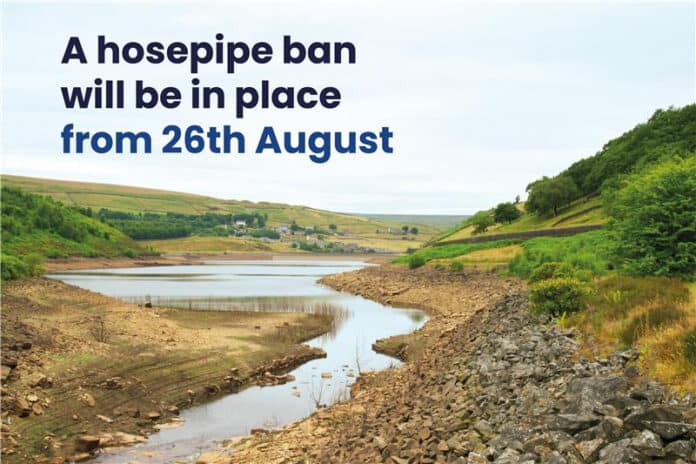Yorkshire Water has announced that it will introduce a hosepipe ban from 26 August 2022 as the drought continues.
The move comes after parts of Yorkshire have seen the lowest rainfall since records began more than 130 years ago.
Yorkshire Water’s director of water, Neil Dewis, said: “The hot, dry, weather means that Yorkshire’s rivers are running low and our reservoirs are around 20% lower than we would expect for this time of year. We’ve been doing everything we can to avoid putting in restrictions but unfortunately, they’re now necessary as part of our drought planning.
“We’re grateful to our customers, who have been saving water where they can this summer. It is really important that we all continue to do so, to help protect our water resources and the environment.
“We’ve been working hard in the background to balance our water stocks through our region-wide grid system (an investment made by Yorkshire Water after the last hosepipe ban in 1995/6) and reduce water lost from leaky pipes (we have reduced this by 50% since 1995/6) – this year we have extra people in our field teams and have adopted a seven-day working pattern so that we can find and fix leaks quicker.
“We’ve been monitoring reservoir levels, weather forecasts and other environmental indicators closely to determine whether we might need to put further measures in place.
“As we’ve now reached that trigger point, we need to make sure that we have enough supply for the essential needs of people across the region this year and next, as well as making sure we’re able to protect our local environment by limiting the amount of water we have to draw from the rivers. Our decision to introduce a hosepipe ban is based on the risk that water stocks continue to fall in the coming weeks and the need to be cautious about clean water supplies and long term river health.
“Having a hosepipe ban in place also allows us to apply for drought permits from the Environment Agency, which means we can abstract more water from our rivers and reduce flows out of our reservoirs so that we can continue to provide the water our customers rely on us for.
Activities covered by the hosepipe ban include:
- Watering a garden using a hosepipe
- Cleaning vehicles or boats using a hosepipe
- Watering plants with a hosepipe
- Filling or maintaining a domestic swimming or paddling pool
- Drawing water, using a hosepipe, for domestic recreational use
- Cleaning walls or windows of domestic premises using a hosepipe
- Cleaning paths or patios using a hosepipe
- Cleaning other artificial outdoor surfaces using a hosepipe
People can still undertake the above activities without using a hosepipe if they use tap water from a bucket or watering can; or use water that is not sourced from taps such as grey water, rainwater from a water butt, or a private borehole, for example.
Businesses will be allowed to use a hosepipe if it is directly related to a commercial purpose. There are restrictions on using a hosepipe if not for those essential commercial needs – so using a hosepipe to clean a path outside a business property, for example, would not be allowed.
For more information on what is included in the ban, go to the Yorkshire Water website.
Meanwhile, an Environment Agency move to prevent a Yorkshire reservoir from drying up has been approved.
On 20 July the Agency made an application to Defra for a ‘drought order’ which will help prevent Holme Styes reservoir in Holmfirth from running dry.
This week the Environment Secretary granted the application. It means the Environment Agency can ask Yorkshire Water to slow the flow of water leaving the reservoir to manage habitats and river flows to protect wildlife. The flow from the reservoir will reduce from 2million litres per day to 1million litres.
The order will have no impact on the public water supply as the Holme Styes Reservoir is a historic mill reservoir and not part of the public water infrastructure.
The Environment Agency declared prolonged dry weather in Yorkshire on 13 July.
Prolonged dry weather is a natural event which has become more likely with climate change. It occurs as a result of low rainfall for an extended period of time. Once prolonged dry weather is declared, actions are taken to minimise impacts on the environment.
If people see any environmental impacts due to dry weather, such as fish in distress, it should be reported to the Environment Agency 24/7 on 0800 80 70 60.

